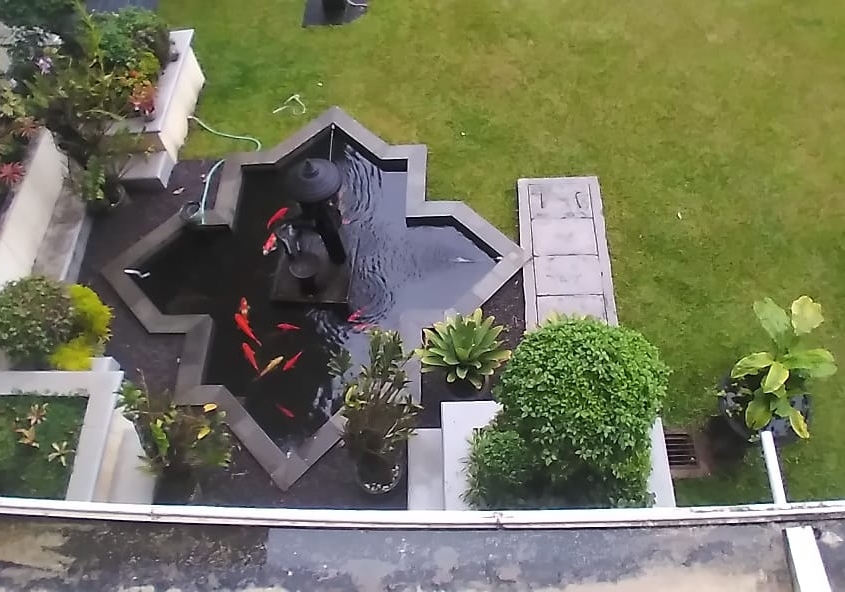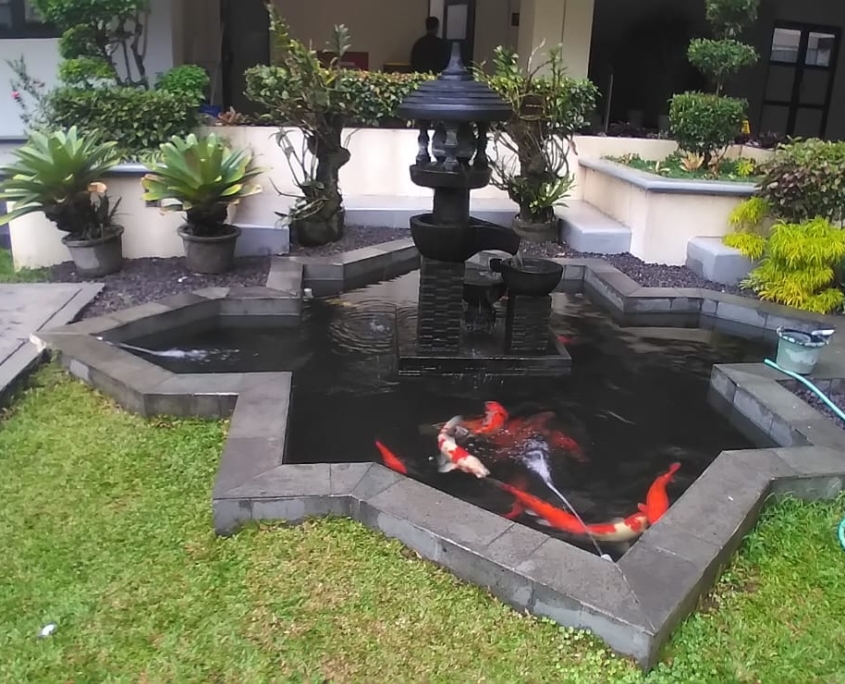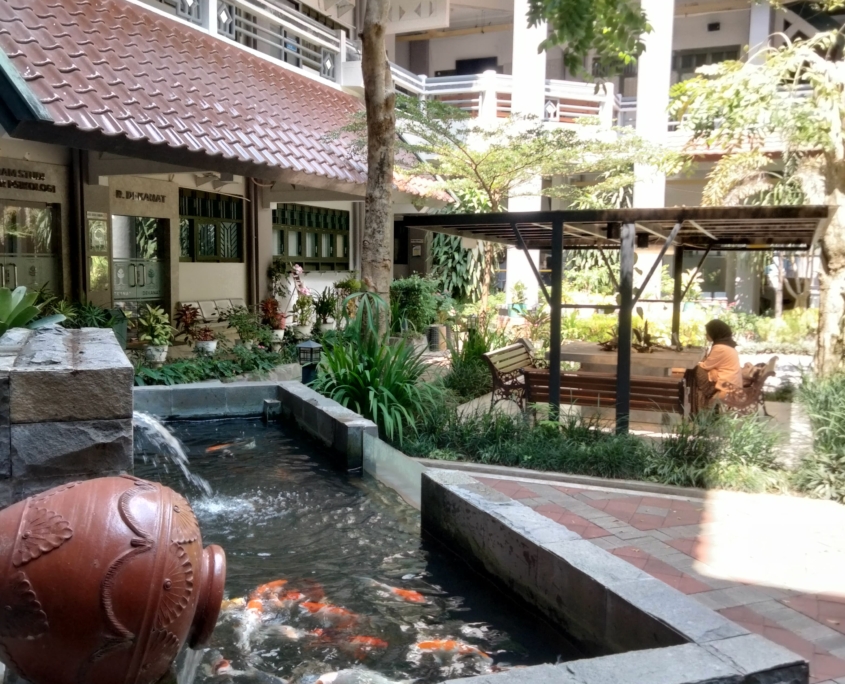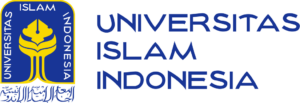Life Below Water

Universitas Islam Indonesia (UII) demonstrates a deep commitment to environmental stewardship by actively supporting aquatic ecosystems, implementing water-sensitive waste disposal practices, and working to maintain local ecosystems. Through a series of well-structured initiatives and collaborations, UII aligns itself with global sustainable development goals (SDGs), particularly those focused on protecting life below water and on land. The university’s integrated approach to environmental sustainability reflects an understanding of the interconnectedness between healthy ecosystems and resilient communities.
UII’s efforts in supporting aquatic ecosystems center on safeguarding water quality and preventing pollution through sustainable campus policies and community partnerships. Initiatives such as the construction of reservoirs on the UII Integrated Campus serve to improve water conservation and regulate water flow, protecting downstream aquatic ecosystems from pollution and erosion. Collaborations with local government bodies, such as the Serayu Opak River Area Main Station, further underscore UII’s role in watershed management and sustainable water resource planning.
In its waste management practices, UII prioritizes water-sensitive solutions aimed at minimizing environmental impact. The university has established preliminary guidelines for waste disposal and water quality standards to ensure that any water discharged from campus activities meets quality benchmarks that protect local wildlife and human health. Additionally, UII has introduced preliminary policies aimed at reducing plastic waste on campus, recognizing its impact on both terrestrial and aquatic ecosystems. These foundational steps support sustainable waste disposal practices and set the stage for more comprehensive water management strategies that contribute to healthy ecosystems.
Beyond campus boundaries, UII is dedicated to maintaining local ecosystems through conservation programs and policies. The university’s commitment to biodiversity is evident in its efforts to incorporate local species into campus planning processes, minimize the impact of invasive species, and foster collaboration with local communities for ecosystem preservation. Tree-planting initiatives, for example, help maintain shared green spaces, while research initiatives provide valuable insights into conserving and restoring threatened habitats.
Through its proactive approach to supporting aquatic and terrestrial ecosystems, UII exemplifies how academic institutions can serve as leaders in sustainability. By addressing the environmental challenges that affect both water and land, UII contributes to a resilient local ecosystem and a more sustainable future for all.
UII’s Efforts in Supporting Aquatic Ecosystems through Education
UII provides substantial educational and research support for freshwater ecosystem management, leveraging the expertise of its Civil and Environmental Engineering departments. The Civil Engineering department plays a vital role in researching innovative methods for flood and drought prevention, addressing critical challenges in water management. Meanwhile, the Environmental Engineering department operates a dedicated water quality laboratory, focusing on preserving and improving the health of freshwater ecosystems.
These collaborative programs not only advance academic understanding but also equip students and local communities with practical knowledge on water conservation, management, and sustainable irrigation practices. By fostering these skills, UII contributes to the sustainable use and protection of freshwater resources, promoting ecological balance and long-term resource availability.

Through these initiatives, UII strengthens its alignment with SDG 14, emphasizing the importance of sustainable water resource usage. The integration of research and community engagement ensures that the knowledge generated within the university extends beyond its campus, benefiting society and the environment at large.
UII’s comprehensive approach to freshwater management highlights its commitment to addressing global water challenges. By combining academic excellence with real-world applications, the university serves as a leader in sustainable water practices and a key player in advancing global water conservation goals.
UII leverages its expertise in environmental engineering to promote sustainable water practices that benefit agricultural productivity and, indirectly, aquaculture sectors. Through its collaborative efforts with local communities, the university provides valuable insights and education on efficient water use, ensuring the health of ecosystems and supporting sustainable resource management.
These initiatives include training programs and workshops that teach best practices in water conservation, irrigation, and resource management. The sustainable water use strategies shared by UII aim to enhance agricultural yields while maintaining the ecological balance essential for supporting aquatic ecosystems.

The university’s focus on sustainable water practices indirectly benefits aquaculture by fostering healthier freshwater systems. This approach aligns with global goals for sustainable fisheries and aquaculture, ensuring that water resources remain viable for diverse uses, including food production and biodiversity preservation.
By bridging academic research with practical community applications, UII demonstrates its commitment to advancing sustainable water management. This dedication reflects the university’s broader mission to contribute to environmental sustainability and aligns with global sustainability goals such as SDG 6 (Clean Water and Sanitation) and SDG 14 (Life Below Water).
While UII’s primary efforts under SDG 14 focus on freshwater ecosystem management, there is significant potential to expand its contributions to broader aquatic conservation topics. Educational outreach on overfishing and responsible fishing practices could complement the university’s existing research into ecosystem resilience and water quality, paving the way for a more holistic approach to sustainable aquatic resource management.
UII’s expertise in environmental engineering and water quality management provides a strong foundation for developing programs aimed at promoting sustainable fisheries. Such initiatives could include community-based workshops, curriculum modules on marine conservation, and collaborations with organizations addressing harmful fishing practices and their impact on aquatic biodiversity.

Expanding UII’s focus to include marine ecosystems and responsible fishing practices would align with global priorities under SDG 14, addressing critical issues such as overfishing, habitat destruction, and pollution. These programs could empower local communities with the knowledge and tools needed to adopt sustainable fishing practices, ensuring the long-term health of aquatic ecosystems.
By integrating its research capabilities with educational outreach, UII has the opportunity to play a leadership role in addressing both freshwater and marine conservation challenges. This expansion would further solidify the university’s commitment to sustainable development and environmental stewardship on a local, regional, and global scale.
UII’s Actions in Supporting Aquatic Ecosystems Conservation
UII demonstrates its commitment to aquatic conservation through active participation in events that promote sustainable practices for oceans, seas, and freshwater ecosystems. For example, the Faculty of Law has organized seminars aimed at empowering coastal communities, addressing challenges in marine governance, and enhancing resilience in coastal ecosystems. These efforts highlight UII’s dedication to fostering awareness and actionable solutions for sustainable aquatic resource management.
Beyond faculty-led initiatives, UII encourages its students to engage in marine conservation discussions, cultivating a culture of responsible ocean stewardship. Through workshops, debates, and academic forums, students gain critical insights into the importance of sustainable practices in protecting aquatic ecosystems. These activities also empower the next generation of leaders to advocate for and implement measures aligned with SDG 14.
By integrating academic knowledge with community engagement, UII ensures a multi-faceted approach to conservation. These events not only support local and regional efforts but also contribute to global conversations on sustainable practices for oceans and freshwater systems.
Through these initiatives, UII reinforces its role as an advocate for environmental sustainability, leveraging its academic and community resources to promote a harmonious balance between human activities and the preservation of aquatic ecosystems.
Although UII has not yet established specific regulations for sourcing from aquatic ecosystems, its commitment to ethical and sustainable practices is reflected in its halal food policy. This policy emphasizes Halalan Thoyyiban principles, which advocate for sustainable and environmentally responsible sourcing across all food products, including those from aquatic ecosystems.
The Halalan Thoyyiban Research and Education (HTREND) center plays a crucial role in advancing these efforts by promoting awareness and education on ethical supply chain practices. Through research and outreach, HTREND underscores the importance of balancing ethical considerations with environmental sustainability, aligning UII’s food sourcing practices with broader sustainability goals.
While current efforts indirectly contribute to aquatic ecosystem conservation, UII recognizes the potential to enhance its impact through targeted policies. By integrating sustainable harvesting principles into its supply chain requirements, the university could further ensure the protection of aquatic biodiversity and the promotion of responsible resource use.
Such initiatives would complement UII’s existing sustainability framework, reinforcing its commitment to ethical consumption and environmental stewardship while paving the way for more direct contributions to SDG 14: Life Below Water.
UII is progressively embedding policies on aquatic ecosystem management into its broader quality assurance framework, demonstrating its commitment to protecting biodiversity and fostering sustainable practices. These efforts reflect UII’s dedication to long-term environmental stewardship, particularly for ecosystems under threat from human activities and climate change.
Collaborating across faculties, UII has initiated research and outreach programs that integrate the conservation of aquatic and terrestrial biodiversity. These programs aim to educate and engage communities on the importance of preserving ecosystems while promoting sustainable resource management practices.
By aligning these initiatives with its academic and operational priorities, UII strengthens its contributions to the objectives of SDG 14: Life Below Water. This holistic approach ensures that biodiversity protection and sustainable practices are deeply integrated into the university’s strategies for environmental sustainability.
UII’s commitment to these principles not only supports global biodiversity conservation goals but also underscores the university’s role as a leader in fostering sustainable development through education, research, and community engagement.
While UII’s direct engagement with the marine industry is currently limited, the university is actively exploring ways to broaden its impact in sustainable technology and environmental innovation. By leveraging cross-departmental collaborations, UII aims to develop technologies and strategies that help industries minimize environmental harm and promote conservation efforts.
These initiatives align with UII’s ongoing expansion in environmental research, which holds significant potential for creating solutions to support aquatic ecosystem preservation. The university’s interdisciplinary approach ensures that diverse expertise contributes to advancing sustainable practices and addressing challenges related to ecosystem degradation.
As UII continues to grow its research and outreach, it is well-positioned to increase its involvement in developing technology-driven solutions for aquatic conservation. This progression not only aligns with UII’s sustainability objectives but also supports broader global goals such as SDG 14 by fostering innovation in the protection of water resources and marine environments.
Through these efforts, UII demonstrates its commitment to contributing to sustainable development and environmental resilience, paving the way for impactful collaborations and advancements in aquatic ecosystem conservation.
UII’s Initiatives in Water-Sensitive Waste Disposal
UII has established stringent water quality guidelines to manage its water discharges, ensuring compliance with environmental standards that safeguard surrounding ecosystems and public health. These measures demonstrate UII’s proactive approach to minimizing environmental impact and maintaining the integrity of aquatic environments.
The university’s procedures include regular monitoring of water quality in campus wastewater and surface runoff. By preventing contaminants from entering nearby water bodies, UII actively reduces the risk of ecosystem degradation and supports sustainable water management practices.
These initiatives align with SDG 14, emphasizing the importance of preserving aquatic ecosystems. UII’s commitment to maintaining high water quality standards highlights its dedication to environmental stewardship and the protection of natural resources.
Through these efforts, UII not only mitigates its ecological footprint but also sets a standard for responsible water management, contributing to broader sustainability goals and fostering resilience in the ecosystems connected to its operations.
UII actively implements a plastic waste reduction strategy through various innovative initiatives, including the nationally acclaimed Project B, spearheaded by Dr. Hijrah. This project focuses on promoting recycling, encouraging the use of alternative materials, and adopting circular economy principles to tackle plastic waste effectively.
By addressing plastic pollution at its source, Project B plays a crucial role in reducing the environmental burden of plastic waste on terrestrial and aquatic ecosystems. These efforts contribute directly to safeguarding marine environments, as they help mitigate the harmful impact of plastic debris on aquatic life.
The initiative’s influence extends beyond the campus, fostering community awareness and action towards sustainable waste management. It aligns closely with SDG 14: Life Below Water, emphasizing the importance of reducing plastic pollution to protect marine biodiversity and ensure healthier ecosystems.
Through programs like Project B, UII reinforces its dedication to environmental sustainability, setting an example for responsible waste management practices and contributing to broader global efforts to combat plastic pollution.
UII takes a proactive approach to waste management by focusing on preventing marine pollution from land-based activities. Its comprehensive policies emphasize reducing plastic waste and fostering sustainable waste management practices across campus, ensuring responsible handling of materials that could otherwise harm aquatic ecosystems.
By minimizing runoff pollution through effective waste segregation and recycling initiatives, UII indirectly contributes to the health of marine ecosystems. These efforts align with SDG 14: Life Below Water, highlighting the critical link between land-based waste management and marine protection.
Although primarily addressing land-based practices, UII’s initiatives have a significant ripple effect on the surrounding environment, preventing harmful pollutants from reaching waterways and, ultimately, the oceans. Programs such as Project B further amplify this impact by promoting community awareness and engagement in sustainable waste practices.
Through its policies and initiatives, UII exemplifies how institutions can support marine conservation indirectly yet effectively, reinforcing its commitment to global environmental stewardship.
UII’s Initiatives for Maintaining Local Aquatic Ecosystems
UII incorporates sustainable building practices into its green campus master plan, aligning with LEED standards to minimize environmental impact. These initiatives focus primarily on land conservation but have a broader effect on surrounding ecosystems, including aquatic environments.
By prioritizing energy-efficient designs, sustainable materials, and water management systems, UII reduces chemical runoff and physical disruptions to nearby aquatic habitats. This contributes indirectly to SDG 14: Life Below Water, ensuring that surrounding waterways and ecosystems are protected from pollutants that can harm aquatic life.
The university’s green campus approach not only promotes sustainability but also fosters environmental resilience by protecting water quality. This commitment to sustainable building practices reflects UII’s dedication to responsible environmental stewardship, which extends beyond the campus boundaries to benefit local aquatic ecosystems.
Through these efforts, UII showcases how integrating sustainable land use practices with environmental conservation can have positive ripple effects on water bodies, contributing to the long-term health of surrounding ecosystems.
UII actively partners with local communities to monitor and manage the health of aquatic ecosystems, fostering collaborative research efforts that address water quality challenges. Through various university research centers, UII engages in projects that assess the health of local water bodies, providing valuable insights into the status of aquatic ecosystems.
These research initiatives are designed to generate science-based data that informs policy and decision-making, directly contributing to SDG 14: Life Below Water by promoting sustainable management of aquatic ecosystems. UII’s commitment to community engagement ensures that local stakeholders are involved in monitoring and addressing water quality issues, strengthening regional efforts to protect aquatic environments.
Through these partnerships, UII not only enhances scientific understanding of local water systems but also helps develop practical solutions that promote ecosystem resilience. This approach supports the goal of sustaining healthy aquatic ecosystems while ensuring the long-term availability of clean water for both human and ecological needs.
UII’s active collaboration with local communities and research institutions underscores its dedication to environmental stewardship and sustainable water management, contributing meaningfully to SDG 14’s overarching objectives.
By supporting community programs and partnerships, UII plays a pivotal role in promoting responsible aquatic stewardship. The university’s research and outreach activities provide valuable knowledge and tools to local stakeholders, helping them adopt sustainable practices in managing water resources and aquatic ecosystems.
UII’s engagement with the community encourages responsible ecosystem management by facilitating the exchange of knowledge on water conservation, pollution control, and habitat protection. This collaborative approach empowers local communities to actively participate in the preservation and sustainable use of aquatic resources.
Through these initiatives, UII not only strengthens local capacity for sustainable water management but also reinforces its broader commitment to SDG 14: Life Below Water. The university’s efforts contribute to the long-term health and resilience of aquatic ecosystems, ensuring that both human and ecological needs are met in a balanced and sustainable manner.
These community-driven programs amplify UII’s impact on the region, fostering a culture of environmental responsibility that extends beyond the campus and into local communities, promoting effective conservation practices and sustainable water usage.
UII emphasizes community collaboration as a central element of its environmental sustainability efforts. Through joint projects and educational initiatives, the university actively engages local communities to implement sustainable practices, particularly in watershed areas. This collaborative model strengthens local capacities for managing and protecting aquatic ecosystems, ensuring that sustainable practices are adopted at the grassroots level.
By working directly with communities, UII helps raise awareness of the importance of conserving shared aquatic resources, such as rivers and lakes, which are vital to both human populations and biodiversity. These efforts foster a sense of collective responsibility for maintaining the health of local ecosystems and promoting sustainable water use.
This approach aligns closely with SDG 14: Life Below Water, as it focuses on improving water quality, reducing pollution, and preserving aquatic habitats through community-driven solutions. The cooperative model encourages long-term engagement in environmental stewardship, helping communities to adapt to climate challenges and safeguard their water resources for future generations.
Through these initiatives, UII is not only enhancing local knowledge and practices but also contributing to broader global efforts aimed at preserving aquatic ecosystems and ensuring sustainable water management. This reinforces the university’s commitment to the principles of sustainable development and environmental justice.
UII has demonstrated its commitment to watershed management by constructing two reservoirs in collaboration with the Serayu Opak River Area Main Station. These reservoirs, strategically located within the UII Integrated Campus, play a crucial role in regulating water resources and supporting the local biodiversity. By managing the flow of water and preserving surrounding ecosystems, the reservoirs help maintain a balanced environment for both terrestrial and aquatic species.
This initiative aligns directly with SDG 14: Life Below Water, as it contributes to the conservation of freshwater ecosystems and promotes sustainable water management. The reservoirs not only serve as water storage and flood control systems but also enhance the quality of the local aquatic habitat, benefiting species that rely on healthy water systems for survival.
Through this partnership, UII has actively engaged in preserving the integrity of the watershed, demonstrating a proactive approach to balancing human development with environmental conservation. The project emphasizes the importance of maintaining ecological equilibrium and ensuring that local biodiversity thrives within a healthy, regulated water system.
By addressing watershed management at the university campus level, UII not only contributes to local environmental sustainability but also sets a model for other institutions and communities to follow in preserving aquatic ecosystems and fostering resilient water management practices.


